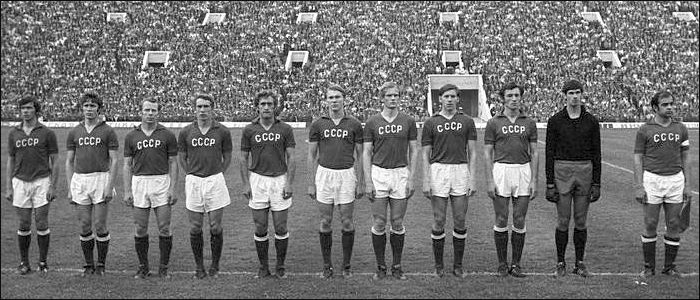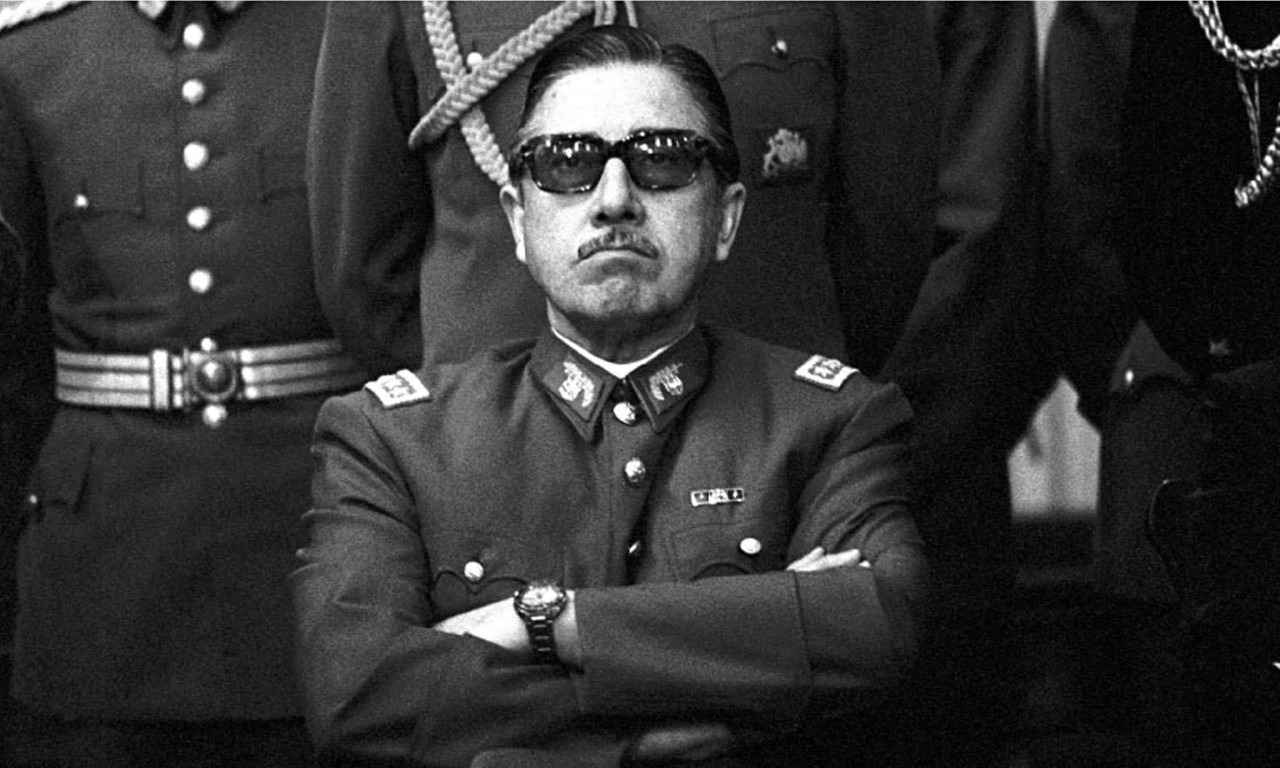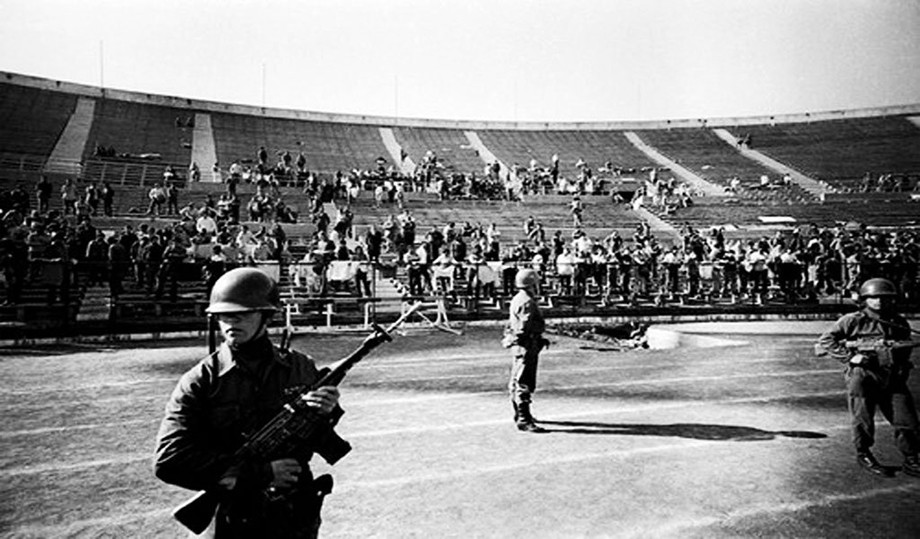Source: www.rucriminal.info
Before the World Cup in Qatar, Rucriminal.info continues to talk about burning curious, historical moments in the popular game.
HOW THE NATIONAL TEAM FROM THE MUNDIAL
The Soviet masters won their frilled, European group for the 1974 World Cup, leaving behind the Irish and French. But, according to the regulations, they had to play a couple of "butt" matches with the Chilean team. Only following the results of two meetings (on their own and someone else's fields), the winner went to the world championship in Germany.
And this should happen: General Pinochet came to power in this South American country shortly before the "butt" football matches of the USSR - Chile! With all the ensuing consequences.
The author of these lines especially remembers the so-called truck owners' strike. It was often reported back then. Drivers of huge trucks blocked roads, refused to deliver goods to their intended destination, paralyzed life in the country in every possible way. President Salvador Allende, who came to power (according to the results of the elections), a supporter of leftist views, was powerless to cope with the growing protests.

Soon, General Augusto Pinochet led a military coup, his supporters stormed the presidential palace. It happened on September 11, 1973. And just a few days later, on September 26, the national teams of the USSR and Chile should play the first "butt" match in Moscow's Luzhniki for the right to play in the final stage of the world championship in Germany.
In the Soviet Central Committee of the party, they immediately decided to break off diplomatic relations with the Pinochet regime. And what about football? After all, this is, in fact, the "calling card" of any power, one way or another, involved in a wonderful game.
The Soviet leadership did not refuse to meet on their field, in Luzhniki. Sports prestige is at stake, and possible participation in the world championship is ahead. Soviet politicians (nobody asked the leadership of the country's Sports Committee), however, banned journalists from appearing at the game. No photos or videos. An exception was made for the only reporter from Chile. Meanwhile, the audience was allowed into the stadium, about 50 thousand fans came!
People saw faded, boring football. No frills, no improvisation. In general, the primitive attacks of the home team were broken on the defensive orders of the guests, who almost did not think about the attack. As a result - 0:0. Of course, they expected more, at least a minimal victory. Alas. Before a possible second leg in Santiago, the situation is unpredictable. Traditionally skilled Latin Americans could have won at home, a one-goal advantage would suffice, taking into account a goalless draw in Moscow. The political and sports leadership of the USSR did not like this at all. Lose to the Pinochet regime? Augusto just really dreamed of defeating the communists on the football field, he did not hide his feelings.
According to the regulations, the second leg was scheduled for November 21 at the central stadium in Santiago. The Soviet leadership not only asked, but demanded from FIFA to move the return "butt" match to a neutral field. Clearly, because of the events in Chile itself. The International Football Federation kept silent. Then they sent a commission to Santiago. Experts issued a verdict: you can play.
It's no secret that the under-tribune premises of the stadium were turned into prison cells. But by the time the FIFA officials visited, the prisoners had been taken almost a thousand kilometers from Santiago, away from people's eyes. The experts saw an excellent quality field, well-groomed stands. Why not play here? The USSR refused to travel to Chile ...

And on November 21, the Chilean national team entered the field in the presence of almost 20 thousand fans. Soviet football players, of course, were not even close. At the whistle of the Austrian referee, the Chileans started the game from the center, passed the ball to each other, and finally scored it into an empty net. Here it is, the desired victory for them. And with it, a ticket to the World Cup in Germany. There, the Chileans flew out of the group stage, having gone home ahead of schedule.
Later, according to the estimates of the leading players of the Soviet national team, including one of the best forwards in the history of Russian football, Oleg Blokhin, he and his partners were ready to fly to Chile. Of course, I really wanted to compete at the World Championships. But politicians decided everything for the athletes ...
TRIO FROM "CANCER", "Swan", "PIKE"
The USSR national team made it to the World Cup only 12 years later, in 1982. I missed the World Cup in Argentina in 1978, because I didn’t go through the qualifying round, I just performed unsuccessfully.
And for some reason, in 1982, the team went to Spain with three mentors at the head - Konstantin Beskov, Valery Lobanovsky and Nodari Akhalkatsi. Konstantin Ivanovich, formally being a senior coach, later said that it was his idea to invite colleagues from other clubs to the national team. Like, they will be closer to their guys, respectively, Kyiv and Tbilisi Dynamo. Help, influence, benefit will increase in terms of achieving results, according to Beskov.
Looking ahead, this idea turned into a farce interspersed with comedy. Right, with a smile and a swoopm sadness listened to tales about how in the event of disagreements, minor quarrels, the people of Tbilisi ran to Akhalkatsi for support, the people of Kiev to Lobanovsky, the Spartacists to Beskov. Truly "kindergarten". Discord and misunderstanding often reigned.
It seems to be true that after the defeat in the first match with the Brazilians in the group, Beskov removed himself from the leadership of the team. The reins of government were taken by Lobanovsky, apparently a specialist with a stronger character than Konstantin Ivanovich.
In general, Beskov was sometimes distinguished by inadmissible softness, playful indecision at key points. He was too safe when it was required, for example, to play sharper, more interesting, more assertive in attack. In his coaching performance, as a rule, a more defensive option followed, which did not always lead to success. Although, yes, at the club level, he is still an outstanding coach. But Brazil then - 1:2, tried to keep a modest 1:0, went on the defensive. Couldn't even win a single one.
"Agreement" on the sidelines?
The fate of the second place in the group was decided in a duel with the Scots (the Brazilians advanced ahead of schedule after two victories in a row). Almost a drama played out. The USSR national team was satisfied with a draw with the best difference between goals scored and conceded. And a couple of minutes before the end, Scotland equalizes the score - 2:2, continues to attack furiously. In the turmoil, he almost scores the third goal ... The referee's saving whistle, and the team, led by a triumvirate of coaches, goes further in the tournament.
Again, like 12 years ago (in 1970), the Soviet team stopped a step away from the semi-finals. With almost the same boring game plot, this time against Poland. Well, it seemed, take a chance, finally, show yourself in all your splendor! After all, the World Cup is held every four years. No, the grayest oncoming lane stood out.
Meanwhile, on the sidelines, at the highest level (almost the Central Committee of the Communist Parties of the USSR and Poland), apparently, a “negotiable” was negotiated. The rationale is as follows: they say, you need to play carefully, even “intelligently”, do not hit each other in the legs, and so on. On the final result, the "high parties", apparently, did not finally agree. The Polish national team was satisfied with a “beaten” draw (again with the best goal difference), the USSR only won with any score.
The opponents, in fact, did not play - they trampled on the field. Especially the Poles abused anti-football. Trite time was dragging on, feigning injuries, with the ball at the corner flag they stood endlessly ... In general, - 0:0. Our "took overcoats", and - home. In the match for third place, the Poles showed that they can attack superbly, defeating France 3:2, thus winning the prestigious bronze medal.
Participation in the 1986 World Cup (in Mexico) was preceded by a huge scandal. During the qualifying round, a well-known specialist, a former Dynamo Minsk player Eduard Malofeev, worked with the national team. And very successfully: the USSR national team from the second place in the qualifying group reached the final stage of the world championship. The players and the coaching staff were already preparing for the flight to Mexico. And suddenly, a few days before departure, sports (rather, near-sports) officials, together with figures from the Central Committee, removed Malofeev from his post, putting Valery Lobanovsky in his place.
The "casket" just opened: the players of Kyiv "Dynamo", who were part of the national team, rebelled. You see, they were disgusted by the manner of communication of Malofeev, who stood up for "sincere football" (Eduard Vasilyevich's "well-wishers" sometimes openly laughed at this term and the author himself). The methods of training the people of Kiev also did not suit them. In general, by hook or by crook they achieved the resignation of the objectionable coach, and the arrival of Lobanovsky to the post.
Valery Vasilyevich, in turn, created a semblance of Dynamo Kyiv from the national team, including almost the entire composition of his favorite club. What came of it? Yes, in principle, nothing good. In the 1/8 finals, the USSR national team, led by Lobanovsky, stumbled on the "aging" Belgians, losing in extra time - 3:4. And went home, not salty slurping.

You can talk as much as you like about judicial arbitrariness (as if at some points the Soviet players were sued). Yes, nothing like that! It has long been noticed: if the Soviet, or now the Russian athletes lose, they immediately “nod” at something otherworldly. For example, arbitration, functionaries of international federations, supposedly, squabbles, intrigues around themselves.
In the match with Belgium, they acted ineptly on the defensive - this is the main reason for the failure at that time. They calculated that they would certainly beat this opponent. And, by and large, they paid, in my opinion, for the bestial attitude towards the same Malofeev ...
Alexey Matveev
Source: www.rucriminal.info






